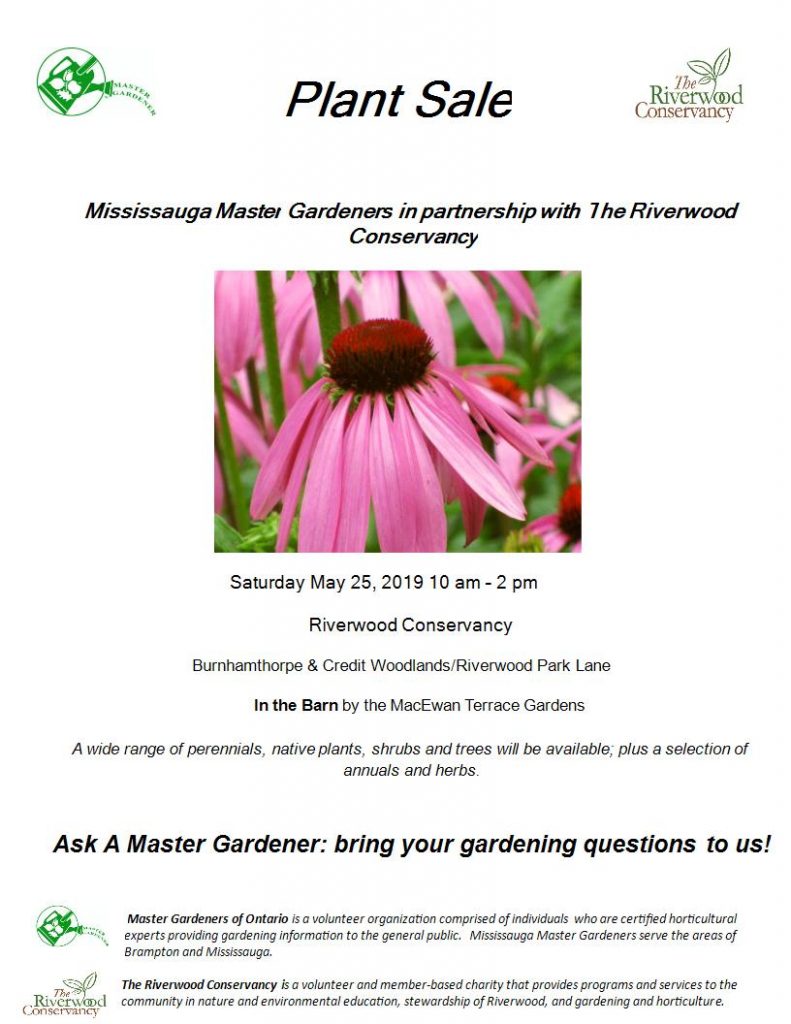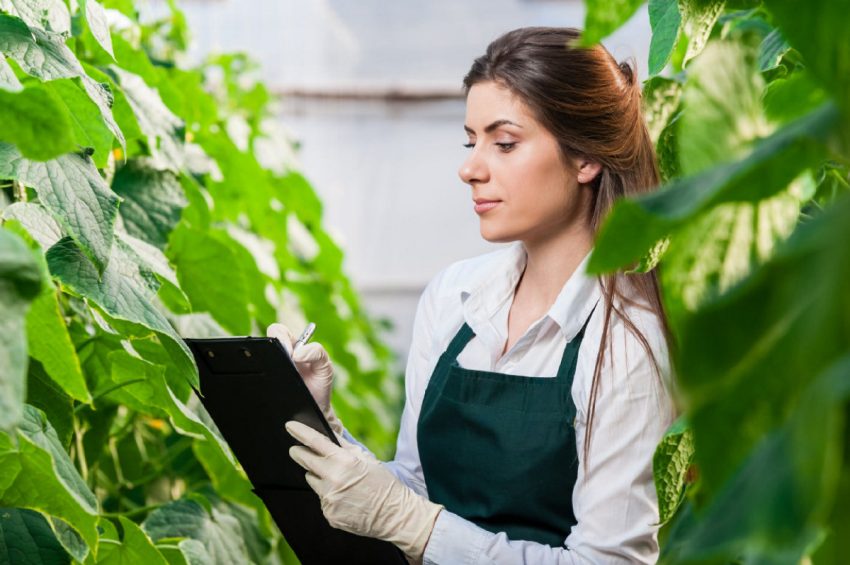Join us on Saturday, May 25th at Riverwood for our annual
MMG SPRING PLANT SALE
10 am to 2 pm: Come early for the best selection.



TORONTO MASTER GARDENERS present their 2018 Technical Update: “Growing Food from Around the World”
@ The Toronto Botanical Garden
Speakers for the day include:
Dena Jackson ▪ Toronto comedian & MC ▪ A Light-hearted Look at Growing Food from Around the World
Conrad Richter ▪ President of Richters Herbs ▪ Welcoming
Migrant Herbs to our Gardens
Villiam Zvalo ▪ research scientist, Vineland Research Station ▪ New Plants in Familiar Places…the Science
Ken Brown ▪ horticulturist, writer & home gardener ▪ Down to Earth Solutions for Growing Unusual Edibles
Saturday, January 13, 2018 ▪ 8:30 am Registration & Coffee ▪ 12 noon Lunch ▪ 4:00 pm Wrap-Up
Tickets $45 on Eventbrite
REGISTER HERE://www.eventbrite.com/e/toronto-master-gardeners-technical-update-2018-tickets-37914027878?%20discount=MGOI2018
Source: Toronto Master Gardeners ▪ Technical Update 2018 Tickets, Sat, Jan 13, 2018 at 8:30 AM | Eventbrite
When it comes to cultivating passion, energy and talent, Canada’s Master Gardeners are standouts.
Master Gardeners are dedicated to the art and science of gardening. And, with their generosity of knowledge and time — on public garden tours, at local horticulture societies, at small shows and big ones such as Canada Blooms and in various online forums — they help sustain a broader community of Canadian gardeners.
The term, or title, Master Gardener is not one that is simply pulled out of the air — or the soil. The real dirt:
In the early 1970s, Washington State University developed the concept that volunteers could get horticulture training they would then share with their communities. The title Master Gardener was borrowed from Germany, where the highest title for horticulture was “Gartenmeister,” which translated to Master Gardener.
Journey North: As the Master Gardener program began to sweep across the U.S. in the early 1970s, Dave Omrod, a plant pathologist in British Columbia was taking note of a problem north of the border: garden centre staff were often ill-equipped with the necessary knowledge to advise backyard gardeners. Omrod joined Bill Peters, a B.C. horticulture specialist, to adapt the Washington State U. curriculum to their west-coast province. They started with a six-week course for willing volunteers. It was an instant success.
With help from a handful of universities and provincial agriculture ministries, the program moved its way across Canada throughout the 1980s.
During the 1990s, provincial governments gradually withdrew financial support, which led to the Master Gardener programs becoming established through independent not-for-profits.

Becoming a Master Gardener: There is no shortcut. Achieved through the Master Gardeners of Ontario Inc., the title’s authority is well-earned.
Why become a Master Gardener? To borrow an old advertising slogan from American Express: It has its privileges. Those include access to technical updates with industry experts. As well, the designation provides access to a group of passionate, community-minded people with a common interest.

Where to find them: Master Gardeners are often present wherever gardening touches our lives:
In countless and often invisible ways, Master Gardeners contribute much to the gardening community at large, elevating both our appreciation and knowledge of horticulture over the years. You could call them the superheroes in our midst
Source: Master Gardeners are in a class of their own: Mark and Ben Cullen | Toronto Star

Agriculture, with its unique ability to sequester carbon on, as Carl Sagan might say, billions and billions of acres, is the only industry poised to reverse global warming. Improved management of cropping and grazing heals land, boosts soil fertility, prevents flooding, enhances drought resilience, increases the nutritional content of food and restores wildlife habitat — while sequestering carbon.
Reforestation, too, plays a key role in the biological solution for clean water and climate change. Trees are an integral part of the water cycle and lock up carbon that would otherwise be warming the planet. As well, they provide habitat to birds and mammals.
For too long, we’ve been diminishing the quality of our land, waterways and atmosphere through agricultural practices that degrade soil. Fortunately, alternatives are available. The growing scientific and policy consensus is that improving soil to retain rainfall and capture carbon makes sense for everyone. Vermont’s leadership in this agricultural revolution, capitalizing on the environmental and market opportunities it provides, makes ecological and fiscal sense.
Read more here Rutland Vermont Herald : //www.rutlandherald.com/articles/using-soil-to-fight-climate-change/

Larkspur (Delphinium elatum)
When starting delphinium seed: freeze the seeds for 2-3 days in the freezer and then scatter then in a 5 inch pot with damp promix.
Keep them at 15 degrees C and cover them. Do not let them dry out. The cool temperatures start the germination process. They do not like bottom heat.
In about 21-30 days sprouts appear, transfer these to 4 inch pots until the leaves grow to the size of a looney. When the roots appear at the bottom of the pot its time to harden plants outdoors on a deck. Plants may be planted in the garden while temperatures are still cool.
The Ontario Delphinium Club is inviting growers to offer garden space to secure seed production locally for the future as seeds from England may decline. Web site: www.ondelphiniums.com Email: info@ondelphiniums.com
Thanks to Marie Pearson for this post.
 Pining for a sanctuary from busy city life?
Pining for a sanctuary from busy city life?New sculpture design unveiled.
“A sparkling new piece of public art will be erected on Burnhamthorpe Rd. W. at the entrance to The Riverwood Conservancy this spring.
Artist Marc Fornes will create an “otherworldly” green, blue and yellow pine tree from aluminum sheets that will appear to shift shapes in varying seasons and weather, depending on your vantage point.
His artist’s statement proclaims that the 25-ft. high work , called Pine Sanctuary, will be “a contemporary update in the natural landscape that forms an iconic and playful signal – creating a unique identity for Riverwood.”… read more from John Steward/Mississauga News
//www.mississauga.com/blogs/post/7196580-pining-for-a-sanctuary-from-busy-city-life-try-riverwood/


Did you know that there is no official national flower for Canada? And after 150 years, don’t you think it’s time we had one?
The Master Gardeners of Ontario do and you can help us make the final choice of the three candidates.
Vote in our national online survey before midnight June 30, 2017 and learn the outcome on Canada Day.
For more details and the link to the survey, click here.
To just go right ahead and vote, click here.
Thanks to Toronto Master Gardeners for this post.